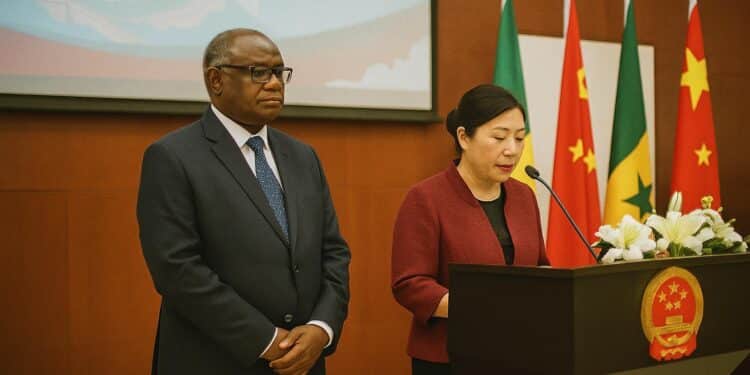Historic Rapport Gains Contemporary Momentum
In the shade of the Congolese capital’s towering jacarandas, Ambassador An Qing’s first major reception underscored a bond that predates both the Forum on China-Africa Cooperation and the Belt and Road Initiative. Beijing first recognised the Republic of the Congo in 1964, but it is the present decade that has witnessed a qualitative leap in bilateral intimacy. Officials in Brazzaville stress a partnership of equals, while their Chinese counterparts evoke the poetic imagery of “shared destiny” (Ministry of Foreign Affairs of PRC). Such rhetoric, though elevated, does reflect a quantifiable reality: China has been Congo’s leading trading partner for eight consecutive years, a statistic confirmed by Congo’s Ministry of Planning.
Economic Partnership Negotiations Pioneer Path
July’s joint declaration to launch negotiations for an Economic Partnership for Shared Development positions the Congo as the continent’s first signatory to this new Chinese template. The framework, according to officials close to the dossier, draws inspiration from free-trade clauses popularised by the Regional Comprehensive Economic Partnership in Asia, yet preserves policy space for Congolese industrialisation. Analysts at the Economic Commission for Africa note that Brazzaville seeks preferential access for timber, manganese and agri-processed cocoa, while Beijing is looking for regulatory clarity on hydro-carbon blocks in the Cuvette basin. For President Denis Sassou Nguesso, the arrangement dovetails with his National Development Plan 2022-2026, which foregrounds value-adding transformation over raw commodity exports. Diplomats describe the accord as a legal architecture that will create what one adviser gently labels “predictable permissiveness” for investors on both sides.
Defence Dialogue Anchored in Medical Diplomacy
The military dimension of the relationship, once confined to training scholarships, today features joint exercises in maritime security and anti-piracy drills along the Gulf of Guinea. Ambassador An Qing’s reference to the hospital ship Peace Ark resonated beyond the festive ambiance; the vessel’s two humanitarian port calls treated over 12,000 Congolese patients, according to the Defence Ministry in Brazzaville. These missions effectively translate power projection into soft-power reassurance, aligning with Beijing’s Global Security Initiative articulated last year. Meanwhile, Congolese officers attending staff colleges in Nanjing testify to the transfer of logistics expertise central to Congo’s capacity-building agenda. Regional observers contend that such cooperation also buffers Brazzaville against the volatility spilling from the Sahel, while avoiding any perception of foreign basing that could unsettle neighbours or partners in Paris and Washington.
Multilateral Context and Regional Implications
Congo’s assumption of the African co-presidency of FOCAC grants Brazzaville an amplified diplomatic megaphone. Preparatory cables seen by specialists indicate that Congolese negotiators aim to champion debt sustainability clauses and climate financing in the run-up to the 2024 Beijing ministerial. The Republic had already secured a partial restructuring of its external liabilities in 2019, an episode frequently cited by critics yet regarded by supporters as evidence of constructive flexibility. International Monetary Fund data show that Chinese loans represent roughly 32 percent of Congo’s public external debt, a ratio that economists in both capitals describe as manageable under current growth projections. By signalling readiness to discuss green-energy corridors linking Inga’s future hydro-output to the Congo River Basin, Brazzaville positions itself as a bridge between Central African ecological priorities and Chinese decarbonisation technologies.
Outlook for a Mutually Reinforcing Trajectory
Officials on either shore of the Yangtze and the Congo Rivers like to invoke the proverbial maxim that great rivers run deep yet silently. The metaphor also captures a partnership that has matured quietly, eschewing the rhetorical crescendos sometimes heard elsewhere on the continent. The coming months will test the resilience of that quiet depth: negotiations must translate diplomatic vows into tariff schedules, environmental impact assessments and joint-venture charters that satisfy both the Congolese imperative for jobs and the Chinese appetite for reliable supply chains.
Yet observers remain confident that the political chemistry between President Denis Sassou Nguesso and President Xi Jinping will shepherd the technical details to fruition. By mid-2025, the twin towers on the banks of the Djiri River, financed through a preferential Chinese credit line, are scheduled to house Congo’s one-stop investment agency—a brick-and-mortar symbol of an alignment that aspires to be as pragmatic as it is rhetorical. Should timelines hold, and contingent upon global commodity cycles, Brazzaville may emerge as a case study in how a mid-sized African economy can navigate strategic dependency while retaining policy autonomy.
In this calibrated dance of silk and timber, ambition and caution, both capitals appear committed to writing what Ambassador An Qing called “new chapters in the annals of Sino-Congolese relations.” The chapters ahead will likely be judged not by ceremonial eloquence but by the tangible dividends they deliver to citizens from Pointe-Noire’s port districts to Chongqing’s foundries, thereby giving quiet substance to a partnership that increasingly shapes Central Africa’s diplomatic cartography.












































